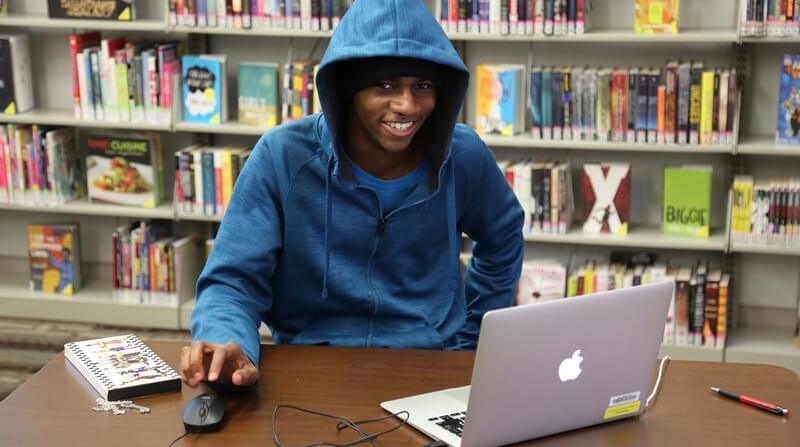As the school year approaches, many students will be doing virtual/remote learning. Without direct access to their school libraries, even more research will be done online. Additionally, in a year where the news is flowing ever faster and more furiously, it’s easy to try to be informed but end up being fooled by doctored photos, half-reported stories and false viral posts.
Carnegie Library of Pittsburgh offers a wealth of digital resources and databases that can aid students when doing research. Students can skip the trawl through Google results and Wikipedia footnotes and instead connect to the primary sources, newspaper and magazine articles, images and graphics and more that are necessary for solid schoolwork.
But there’s more to the information landscape that must be parsed: memes and viral photos, listicles with no citations, and on and on. The tools of media literacy can help sharpen critical thinking about what gets shared online. As information technology professor Joyce Valenza writes in her article entitled “Truth, truthiness, triangulation: A news literacy toolkit for the ‘post-truth’ world” on the NeverEnding Search blog,
“We need to teach the important lessons of everyday civics for new consumption and production landscapes. These lessons involve sustained critical thinking, a practice to engage in regularly as we read and view and inquire with learners of all ages across disciplines.”
Click through to read her extremely thorough post, complete with a set of questions one can ask oneself when evaluating a news story.
Luckily, there are a good number of sites out there to help. Here are a few with fun tools and activities to get you thinking about news literacy and how to evaluate news sources.
The News Literacy Project and Checkology
The News Literacy Project, a nonpartisan nonprofit, aims to provide ways for educators and members of the public to teach and learn how to critically consume news. To this end they have a product called Checkology – which is free to all school educators right now – that is an e-learning platform for middle and high school students, full of lessons on evaluating and interpreting information, using real life examples and experts.
Some of the skills taught are lateral reading, or verification of information while you are consuming it, using reverse image search and archived websites, developing critical observation of images (more on this below), and learning about geolocation and domain search investigation of websites.
For example, an image was being widely shared through Facebook and dubious news sites of an anti-mask protest supposedly in Berlin:

This is actually a photograph of a festival in Zurich in 2019. While this can be checked on Politifact, you could also use Google Maps Satellite View to further confirm that this is Zurich, by matching recognizable parts of the image to features of the landscape in the satellite view.
If you aren’t a student or educator, the News Literacy Project website has a section called Get Smart About News with quizzes, activities and graphics meant to teach the general public about news literacy. Start with this pdf of a decision tree: “How to Know What to Trust,” and sign up for their weekly newsletter called “The Sift” that covers recent hoaxes, rumors and misinformation. They have also developed an app called Informable that gamifies news literacy to keep your brain sharp.
First Draft News and Verification Activities
First Draft News was founded in 2015 as a coalition of nine media verification organizations and has since expanded to a network of organizations invested in ethical and verified news reporting. Its website houses courses and simulations for journalists, collections of international newsrooms that can collaborate on misinformation, field guides to fake news, and a host of training activities and webinars. The latest of these is focused on COVID-19 reporting. Because it is an international organization, their materials are available in many languages.
One very useful activity is their collection of Geo-location interactives. In these, a photograph is given and viewers must use clues within the photo to figure out where it is located. This is useful for helping to spot photos that are being used to illustrate fake news stories.

Don’t miss the free set of flashcards that provide information on safe investigation and reporting.
A project of the Freedom Forum, NewseumED provides free resources for learning media literacy skills, using historical sources to connect to current events. To access the content, you simply have to create a free account.
Their website includes lesson plans, digital graphics, Quizzes and themed collections, for all age levels. Classes and Training can be browsed by audience. This link will take you to a collection of their Maps, Polls, Quizzes and Themes – find out what your Freedom Type is, look at a Women’s Suffrage Movement Interactive Map and more.
Heard a rumor online and want to know more? Go to Emergent’s site. They will tell you the originating sources, if these sources are reliable, how much the story has been shared, and if the news story is true or false and why. It is a project of The Tow Center for Digital Journalism at Columbia University.
For a more in-depth study for an aspiring journalist, the Data Journalism website, sponsored by the European Journalism Centre and the Google News Initiative, has free courses in reporting best practices when using data and articles examining how newsrooms have used data to tell stories.
A free account provides access to track progress in the video courses. Some examples of courses are Countering Hate Speech, Doing Journalism with Data, and Verification: The Basics.
Bellingcat is a place to go to find the backstory to the latest news stories and analysis of tools for media verification. Their global collective of researchers, journalists and investigators compiles information on what is being reported on stories like the Beirut explosion, using Google Earth’s Three Dimensional View, and following missing millions in a money laundering case.
The Poynter Institute describes itself as “a nonprofit school for journalists and a publisher of original journalism.” Its News University offers courses on such things as Reporting in the Age of Social Justice and MediaWise Voter Project Fact-Checking Certificate. Many – but not all – are free due to sponsorship from different companies and organizations.
These are just a selection of the myriad websites, browser extensions and organizations devoted to news literacy. Find more in these lists:
- Verification Junkie: a Directory of Tools for Verifying Content
- Tech Notes: 15 Tools for News Literacy
- ISTE: 10 Sites for Fact Checking
- Common Sense Media: Best News and Media Literacy Resources
- James Madison University Lib Guide for Media Literacy Tools
If you are new to our eResources, check out these tutorial videos on how to get started. If you have any additional questions, you can contact a librarian through Facebook, Instagram or Twitter. You can also call us at 412-622-3114 or email us at info@carnegielibrary.org.


